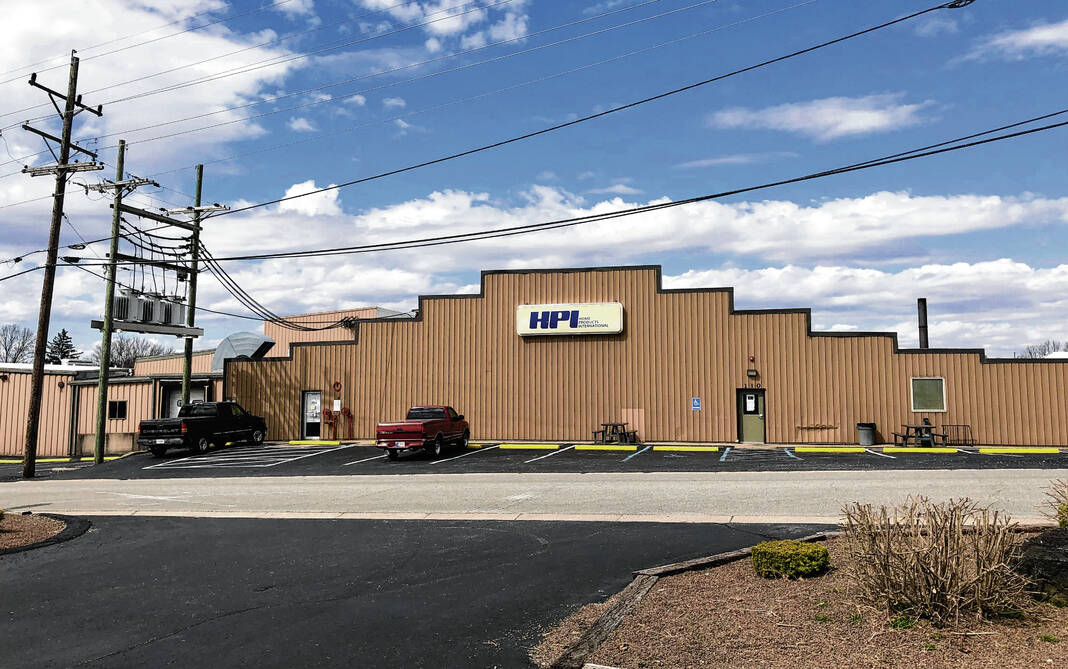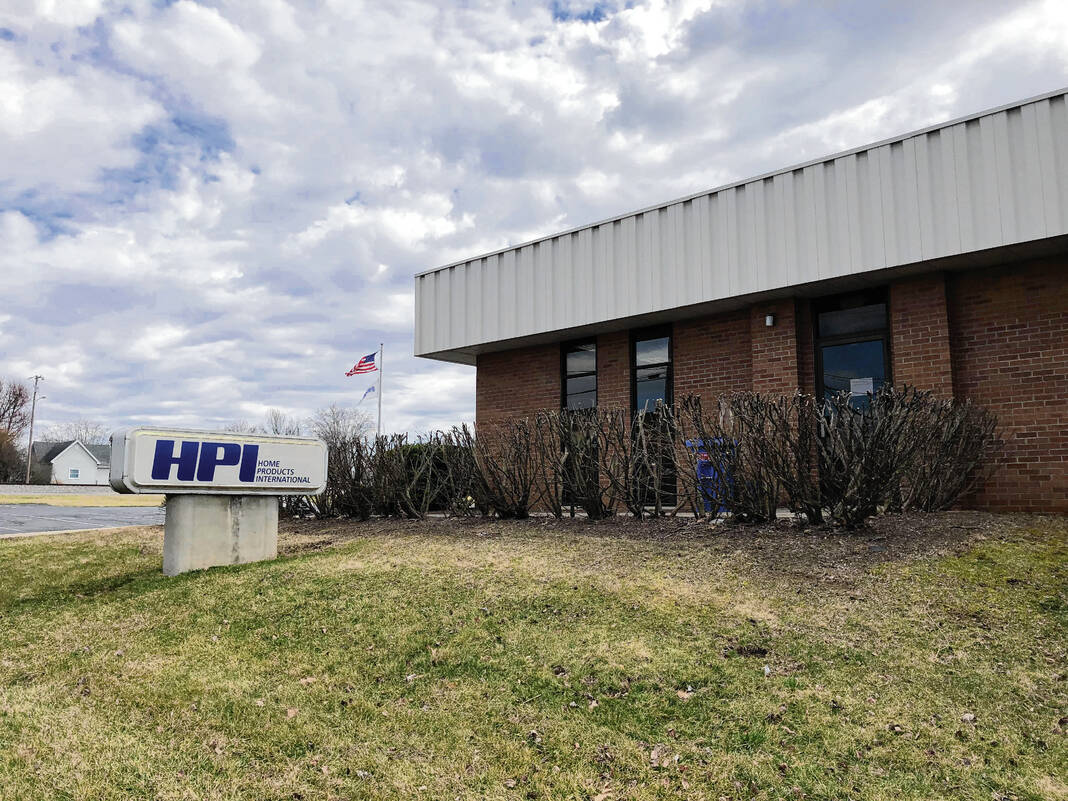
Home Products International in Seymour closed in May, but the facility will reopen as Seymour Home Products on Sept. 6.
Lori McDonald | The Tribune

The administration area of Home Products International was at 885 N. Chestnut St., Seymour. HPI closed in May, but the facility will be fired up Sept. 6 as Seymour Home Products to start making ironing boards again.
Lori McDonald | The Tribune
On Sept. 6, Seymour will once again be home to the only ironing board maker in the United States.
At 6 a.m. that day, the machines inside a building at 110 W. Ninth St. will be fired up to produce the first ironing board since Home Products International manufactured the last one on May 27.
This time, the official company name will be Seymour-MFG.LLC with the operating name Seymour Home Products, Chief Operating Officer Tom Day said Wednesday.
“The good news is on Sept. 6, we plan to start full production on the ironing board again,” he said. “We are in the process — we pretty much have got it done — of recalling over 50 people right now. Those people will be at somewhat higher-paying jobs, and we’re going to treat them like gold because that’s what they are to us. We’d love to have them back, and we’re planning to be there and welcome them at 6 o’clock in the morning, get them in, get them started.”
In March, Home Products International-North America Inc. announced it intended to pursue an exit of its Seymour-based garment care and home organization businesses to focus on its core plastics business, according to a news release from the Chicago, Illinois-based company.
HPI owned and operated several metal stamping plants and distribution centers in Seymour.
The company traced its roots to 1942 when Seymour Tool and Engineering was established. In 1966, it was renamed Seymour Industries and began making ironing boards, other housewares and Beauti-Glide metal bed frames.
Two years later, Chemical Ventures Partners of New York bought the company from Lear Siegler in 1968 and renamed it Seymour Housewares Corp. Then in 1986, Seymour Housewares started making ironing board covers.
In 1998, Home Products International paid $100.6 million, and the ironing boards made here became part of HPI’s full line of laundry, storage and bath products.
At the time of HPI’s closure in May, it employed approximately 130 employees in Seymour.
Chief Executive Officer George Hamilton said market conditions over the past two years driven largely by the COVID-19 pandemic combined with unprecedented inflation in steel costs and global supply chain challenges made it impossible for HPI to continue to operate profitably.
The company notified its employees and worked closely with the Indiana Department of Workforce Development and local government officials to help its employees with re-employment assistance.
After HPI shut down, different companies looked at it, but nothing ever came of that, said Day, who was director of operations for that company.
“We thought, ‘Well, somebody might buy us. After all, it’s an ironing board factory. There’s no other ironing board factories in the United States,’” he said. “We had some foreign companies consider it, looking at it, but when it came down to it, there were two companies that were actually bidding for us at the end.”
That, however, was right before an auction after the home company had filed Chapter 11 bankruptcy, and a lot of the machines had been disconnected, he said.
“At the last moment, we had an interested company that purchased us and just purchased really the building and the land and the assets, not the company at all,” Day said.
HDS Trading Corp. of New Jersey, which was established in 2002 as a vendor in the housewares products market and has grown to include more than 4,000 diverse items, was the buyer. Ownership changed Aug. 2, but the purchase price was not disclosed, Day said.
“They swooped in at the last moment and saved us, and there are 40, 50 jobs more in Seymour, and plus, it means we’re back on the map for making ironing boards in the U.S.,” he said.
Since then, Day and three others have been calling people who previously worked for HPI and asking if they want to come back. Eight to 10 office jobs and 45 to 55 factory jobs will be available at the start.
“Of course, different people had different emotions about it,” Day said. “Some accepted work in different places and whatnot. Some have decided to change jobs and come back to work for us. Others decided to move on. But the vast majority were thrilled with the idea of coming back and making ironing boards.”
He said that fills his commitment.
“When we shut down, I really didn’t feel like it was a fair way for us to end the operations here,” he said. “It’s a matter of pride for us to be able to open this back up and also bring back meaningful long-term work for our people. That’s their family. Hopefully, they’ll be able to come back and finish their career with us. A lot of them saw the last ironing board go down the line, and most of them will see the first new ironing board come down the line, so that’s great.”
Most of the employees will work in the administration area at 885 N. Chestnut St. and the plant on West Ninth Street, while the plant at 201 S. Jackson Park Drive will have limited operations making tubes and some other items, Day said.
“Eventually, we hope to open that back up, too,” he said.
The facility at 400 S. Airport Road is basically a warehouse and will remain as such, he added.
At the main plant, the priority right now is getting the machines operational since they had been prepared to be auctioned off.
“(That) means that you have to put the lubrication back in them, have to put the connections back together, have to assemble back the tools that went with them, the customization things that made them what they did,” Day said.
“You took those off to be able to sell them, and now, we have to put them back on or rebuild them because the auction company was not very delicate with what they kept and what they threw away,” he said. “So we basically are getting a fresh start with new accessories on our equipment so that we can do the best job we can.”
At the start, the main product will be ironing boards. Then a number of other products will be added as the opportunity and market demand, Day said.
“The plans are to have numerous products made here, and we will grow the business, but it’ll be a little while before we can get beyond making all of the ironing boards that we need,” he said. “That’ll be the plan is to invest in the community and the people and invest in operations here.”
